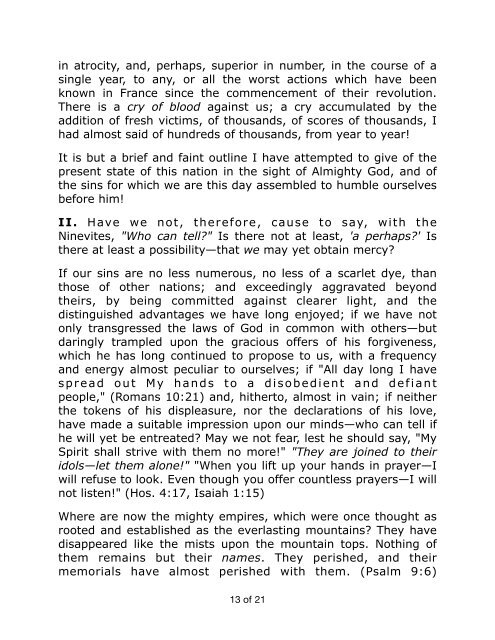Imminent Danger John Newton
The Imminent Danger and the Only Sure Resource of this Nation by John Newton, February 28, 1794, the day appointed for the national fast In this very relevant sermon on Jonah 3:9, John Newton warns of the impending judgment of God upon sinful men and nations. He calls us to repent and humble ourselves before God before it is too late. The only sure refuge for us is the mercy of God in Christ."Who can tell? God may turn and relent; He may turn from His burning anger so that we will not perish!" Jonah 3:9
The Imminent Danger and the Only
Sure Resource of this Nation
by John Newton, February 28, 1794,
the day appointed for the national fast
In this very relevant sermon on Jonah 3:9, John Newton warns of the impending judgment of God upon sinful men and nations. He calls us to repent and humble ourselves before God before it is too late. The only sure refuge for us is the mercy of God in Christ."Who can tell? God may turn and relent; He may turn from His burning anger so that we will not perish!" Jonah 3:9
Create successful ePaper yourself
Turn your PDF publications into a flip-book with our unique Google optimized e-Paper software.
in atrocity, and, perhaps, superior in number, in the course of a<br />
single year, to any, or all the worst actions which have been<br />
known in France since the commencement of their revolution.<br />
There is a cry of blood against us; a cry accumulated by the<br />
addition of fresh victims, of thousands, of scores of thousands, I<br />
had almost said of hundreds of thousands, from year to year!<br />
It is but a brief and faint outline I have attempted to give of the<br />
present state of this nation in the sight of Almighty God, and of<br />
the sins for which we are this day assembled to humble ourselves<br />
before him!<br />
II. Have we not, therefore, cause to say, with the<br />
Ninevites, "Who can tell?" Is there not at least, 'a perhaps?' Is<br />
there at least a possibility—that we may yet obtain mercy?<br />
If our sins are no less numerous, no less of a scarlet dye, than<br />
those of other nations; and exceedingly aggravated beyond<br />
theirs, by being committed against clearer light, and the<br />
distinguished advantages we have long enjoyed; if we have not<br />
only transgressed the laws of God in common with others—but<br />
daringly trampled upon the gracious offers of his forgiveness,<br />
which he has long continued to propose to us, with a frequency<br />
and energy almost peculiar to ourselves; if "All day long I have<br />
s p r e a d o u t M y h a n d s t o a d i s o b e d i e n t a n d d e f i a n t<br />
people," (Romans 10:21) and, hitherto, almost in vain; if neither<br />
the tokens of his displeasure, nor the declarations of his love,<br />
have made a suitable impression upon our minds—who can tell if<br />
he will yet be entreated? May we not fear, lest he should say, "My<br />
Spirit shall strive with them no more!" "They are joined to their<br />
idols—let them alone!" "When you lift up your hands in prayer—I<br />
will refuse to look. Even though you offer countless prayers—I will<br />
not listen!" (Hos. 4:17, Isaiah 1:15)<br />
Where are now the mighty empires, which were once thought as<br />
rooted and established as the everlasting mountains? They have<br />
disappeared like the mists upon the mountain tops. Nothing of<br />
them remains but their names. They perished, and their<br />
memorials have almost perished with them. (Psalm 9:6)<br />
13 of 21

















